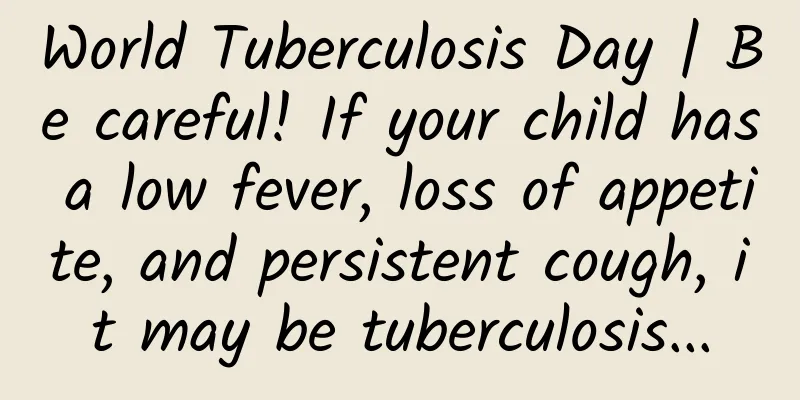World Tuberculosis Day | Be careful! If your child has a low fever, loss of appetite, and persistent cough, it may be tuberculosis...

|
According to the 2021 Global Tuberculosis Report released by the World Health Organization (WHO), in 2020, there were 9.87 million new tuberculosis patients worldwide, of which 56% were adult male patients, 33% were adult female patients, and 11% were children. Tuberculosis has become one of the major diseases that seriously endanger children's health. WHO and all countries have made the control of childhood tuberculosis a priority in the prevention and control of infectious diseases, and have proposed a global development strategy of "striving to achieve zero deaths from childhood tuberculosis" and "ending tuberculosis worldwide." It is urgent to maintain the health of children with tuberculosis and improve their survival rate and quality of life. So, how does tuberculosis occur in children? And how can it be treated and prevented? Tuberculosis is a chronic infectious disease caused by Mycobacterium tuberculosis (TB). The tuberculosis bacteria can invade organs throughout the body, and all organs can be affected, but pulmonary tuberculosis is the most common. Childhood tuberculosis refers to tuberculosis in children aged 0 to 14 years old, mostly occurring in children under 5 years old, and 70% to 80% of cases are pulmonary tuberculosis. The clinical manifestations of tuberculosis in children vary greatly from person to person, and common symptoms include fever, cough, fatigue, night sweats, loss of appetite, and no or no weight gain, etc. Mild cases may have no symptoms and can only be found during routine examinations; severe cases are mainly characterized by symptoms of tuberculosis poisoning (in addition to local symptoms such as cough, chest pain, and chest tightness, there are also more obvious systemic symptoms such as fatigue, low-grade fever in the afternoon, loss of appetite, and night sweats, etc.), with dry cough and mild dyspnea being the most common symptoms. Infection is prone to occur 1 The respiratory tract is the main route of transmission of tuberculosis. Children can become infected after inhaling droplets or dust containing Mycobacterium tuberculosis, forming primary lesions in the lungs. A few can also be infected through the digestive tract, forming primary lesions in the intestines. 2 The source of infection for children with tuberculosis is usually an adult with tuberculosis in the family, but they may also be infected in public places such as schools. 3. 4 to 6 weeks after primary infection, children will develop a specific immune response. The immune response of most children can prevent the further growth of Mycobacterium tuberculosis, which will become latent in the body. However, for children with low immunity, or when children who carry Mycobacterium tuberculosis have low immunity, Mycobacterium tuberculosis will multiply, thus inducing the occurrence of tuberculosis in children. Whether a child develops tuberculosis after being infected with tuberculosis bacteria depends on the virulence and quantity of tuberculosis bacteria, the strength of the body's resistance, and genetic factors. In addition, newborns are very susceptible to tuberculosis bacteria. Treatment should be timely Drug treatment for tuberculosis in children should follow the principles of early, appropriate, combined, regular and full course. Currently, the first-line anti-tuberculosis drugs recommended by WHO for children include isoniazid, rifampicin, pyrazinamide and ethambutol, and the recommended dosages are as follows. Regarding drug dosage, WHO recommends that children under 5 years old use the upper limit of the recommended dosage, and adolescents and older children (weight up to 25 kg) use adult dosages for treatment. Source: Current status and progress of drug treatment for tuberculosis in children[J]. Chinese Journal of Practical Pediatrics, 2020, Prevention is key 1 The source of infection for children with tuberculosis is often adult tuberculosis patients in their family. Timely detection and complete cure of tuberculosis patients in family members is the key to preventing children from being infected with tuberculosis. 2. BCG vaccination of newborns can improve resistance to tuberculosis and reduce the incidence of tuberculosis in children. However, the protective power of BCG is limited, and children who have been vaccinated with BCG should also pay attention to preventing infection with Mycobacterium tuberculosis. 3 Schools and families should open windows regularly to ventilate and keep the indoor air fresh. According to statistics, 99% of tuberculosis bacteria in the air can be blown away after 4 to 5 ventilations for 10 minutes each time. 4. Cultivate good hygiene habits in children, ensure adequate sleep, a balanced diet, strengthen physical exercise, and improve immunity. Author: Du Saifei, Chief Pharmacist, Harbin Children's Hospital Affiliated to Harbin Medical University Review expert: Jin Yan, chief pharmacist of Harbin Children's Hospital affiliated to Harbin Medical University Wu Gaolei, deputy director and pharmacist of Dalian Women and Children's Medical Center |
<<: It’s too late to drink coffee when you’re sleepy!
>>: The story of Professor Lu Shuihua's team's efforts to tackle tuberculosis
Recommend
What causes blood clots during menstruation?
Many women will experience dysmenorrhea during me...
What should I do if I have pimples in my vagina?
As we all know, gynecological diseases trouble ma...
Girls should know the skills of wearing high heels!
High heels are a great way to increase women'...
Can breast hyperplasia nodules become cancerous?
Breast hyperplasia nodules can become cancerous, ...
How to improve the quality of critical care in ICU
With the continuous development of medical techno...
Can I drink soda during my period?
Women often need to pay attention to many issues ...
Is it good to wear shaping bras?
Nowadays, many female friends choose to wear shap...
How to check for endometriosis? Three tests to know!
Endometriosis is a disease of the endometrium tha...
Hyperthyroid mothers breastfeeding need to pay attention to these
The breastfeeding period is not only a critical p...
Regulating your menstrual period in this way can make women become more beautiful quietly!
Enjoy a massage Some traditional old ideas hold t...
Can a woman with hyperthyroidism be cured?
There are three ways to treat hyperthyroidism: th...
How long does fungal treatment usually take?
Many women who suffer from candidal vaginitis are...
Abdominal pain 3 days after abortion
Abortion has a relatively large impact on women&#...









